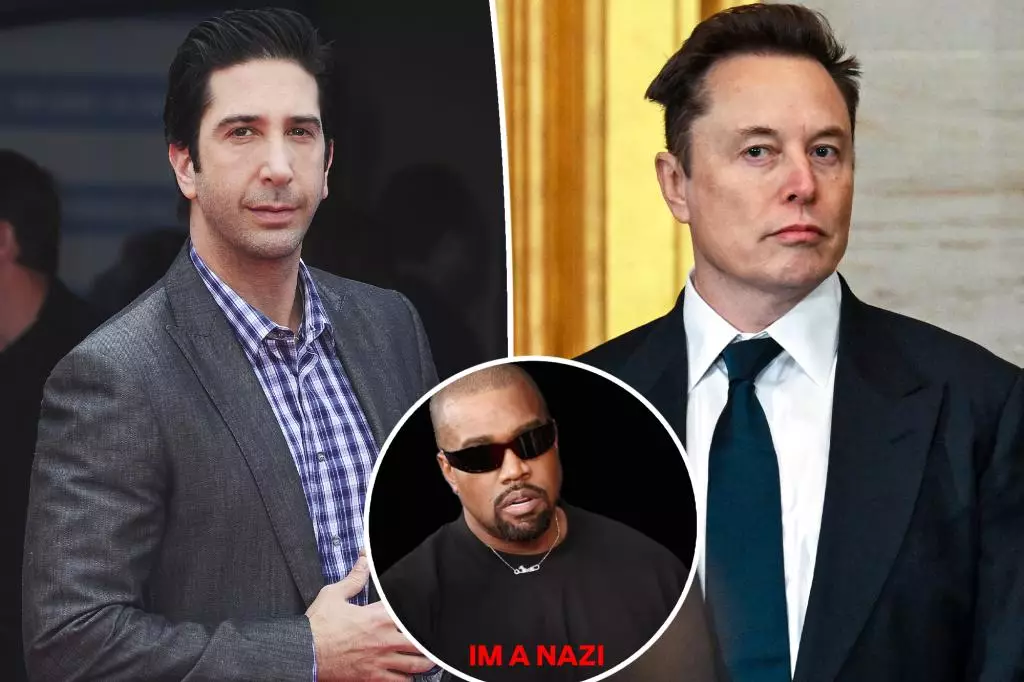The emergence of social media has transformed the landscape of communication, allowing individuals to express their thoughts and opinions to vast audiences. While this democratization of information has its merits, it has also given rise to significant challenges, particularly in terms of hate speech and the spread of harmful ideologies. Recent events surrounding Kanye West, a prominent figure with considerable influence, highlight the urgent need for accountability on platforms that serve as megaphones for such rhetoric.
When celebrities speak, their words can carry weight beyond their intended meaning. Kanye West, now known as Ye, is no stranger to controversy. His recent statements, which have been categorized as antisemitic and hateful towards marginalized communities, underscore the dangers of unchecked celebrity influence. With a staggering 32.7 million followers on X, West has the ability to reach millions with messages that promote bigotry and promote stereotypes. David Schwimmer, an esteemed actor known for his role in “Friends,” recognized this alarming trend and voiced his concerns on social media, directly addressing X’s owner, Elon Musk. Schwimmer’s insistence that silence equates to complicity speaks volumes about the collective responsibility we bear in combating hate speech.
As Schwimmer articulated, West’s statements do not exist in a vacuum; they have real-world implications. History has shown us that hate speech can lead to violence against targeted groups, and Schwimmer urged for a reckoning regarding the permissibility of such expressions on social platforms. His plea raises critical questions about the responsibility of social media companies to not only recognize harmful content but also to act decisively against it.
Ye’s recent outbursts reflect a deeper societal issue regarding the persistence of antisemitism and other forms of hate. His proclamations, including the declaration of love for Hitler and frequent outright racist claims, are not isolated incidents; they are indicative of a troubling trend where individuals dare to express extremist views without fear of repercussions. This raises the question: how does such rhetoric gain traction in today’s society?
The prevalence of stereotypes that West perpetuates cannot be overlooked. These stereotypes often serve to dehumanize groups and reinforce unjust power dynamics. They also tap into historical prejudices that have been weaponized throughout history. In a platform that prides itself on freedom of expression, how do we ensure that this freedom does not spiral into harmful rhetoric that endangers others?
Schwimmer’s remarks highlight a crucial point: social media companies wield immense power and have a responsibility to regulate the discourse that takes place on their platforms. By allowing incendiary figures to flourish, they not only enable the spread of hate but also risk normalizing such attitudes. Schwimmer’s call for action directed at Elon Musk signifies a growing outcry from individuals who feel that social media must take proactive steps to curb hate speech.
Indeed, the question of accountability looms large. Should platforms like X be mere hosts for any expression, regardless of the potential harm? Or do they have an ethical obligation to foster a safe environment where hate speech is unequivocally rejected? The answer is complex, involving both legal and moral dimensions that demand careful consideration. As users of these platforms, we too must evaluate our own roles, recognizing that tolerance of hate speech can lead to complicity.
Ultimately, the incident involving Kanye West and David Schwimmer serves as a sobering reminder of the pervasive nature of hate speech and its potential consequences. It calls upon us all—celebrities, social media executives, and everyday users—to advocate for a discourse that prioritizes respect and understanding. As we navigate the complexities of free speech versus hate speech, let us recommit to fostering an online world that champions compassion over divisiveness.
While Kanye West may have the power to reach millions, it is equally vital for influential voices like Schwimmer’s to rise in opposition. The collective outcry against ideologies that breed hate can serve not merely as a counter-narrative but as a clarion call for action: we must not allow hate to flourish in the cracks of silence. Let us stand together in promoting a more inclusive dialogue that celebrates our shared humanity.

